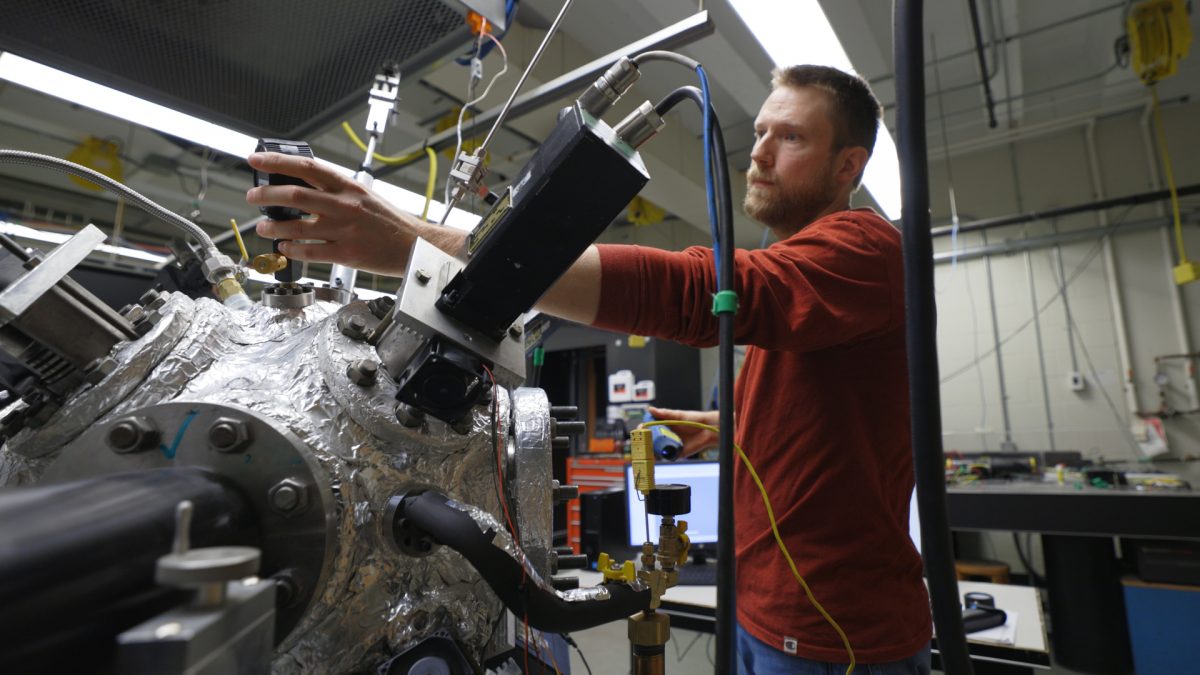
Cam Verwey adjusts the spherical fan-stirred chamber used in his award-winning PhD research
How gasoline can help engines get green
It may seem counter-intuitive, but studying fossil fuels can help our progress towards greener transportation.
Current combustion engines require liquid fuel to be converted into a fine mist of droplets before it can evaporate, ignite and burn to release energy.
As a graduate student in the department of mechanical engineering, Cam Verwey looked at how these droplets of fuel evaporate in an engine to reduce emissions and set the stage for biofuel performance. His research has been recognized with a University of Manitoba Distinguished Dissertation award.
“Anything we can do to create incremental improvements in combustion systems may be more important than ever, just because of the state of our climate and dwindling petroleum resources,” he explains, citing projections from the Canada Energy Regulator that suggest society will still be reliant on liquid fuels for decades to come.
He adds: “The eventual transition away from liquid fuels does not relieve engine designers of the responsibility to continue refining their existing products. Right now, it’s desperately needed.”
Understanding how quickly fuel droplets evaporate in certain turbulent conditions has been a considerable challenge for researchers in the past, but Verwey developed a novel method that has helped fill this critical knowledge gap.
Using a specialized spherical fan-stirred chamber he was able to isolate individual droplets of fuel, record its evaporation through high magnification optics and then analyze it using computer software.
“It’s taking a tiny piece and creating a building block to understand a very complex phenomenon. What we found was that this turbulent flow is a lot more impactful in certain situations than was previously thought.”
This benchmark data can now be used by other researchers and engine designers to improve current-state engines. It’s even been picked up by another UM researcher, PhD student Arash Arabkhalaj, who is studying the biofuel butanol.
“As we shift more towards greener fuels, a lot of those aren’t nearly as tested as classic liquid petroleum refined products. So the more information we have on these new waves of green fuels, the better equipped we are to design systems to take advantage of their specific properties.”
Verwey’s research also has applications outside mechanical engineering, including atmospheric science and infectious disease – any environment where fine droplets are present.
Since graduating, Verwey has joined the Price Faculty of Engineering as an assistant professor where he is hoping to make connections with industry to help bring this practical science into real-world application.
University of Manitoba Distinguished Dissertation Awards are given to graduating doctoral students who have been nominated by their faculty/college/school for a dissertation that represents a ground-breaking piece of original work. Each year, one award is offered in each of the following categories: applied sciences, health sciences, humanities, natural sciences, and social sciences. Awardees receive a $3,000 prize.
Curious about graduate studies? Check out all of UM’s graduate programs.






